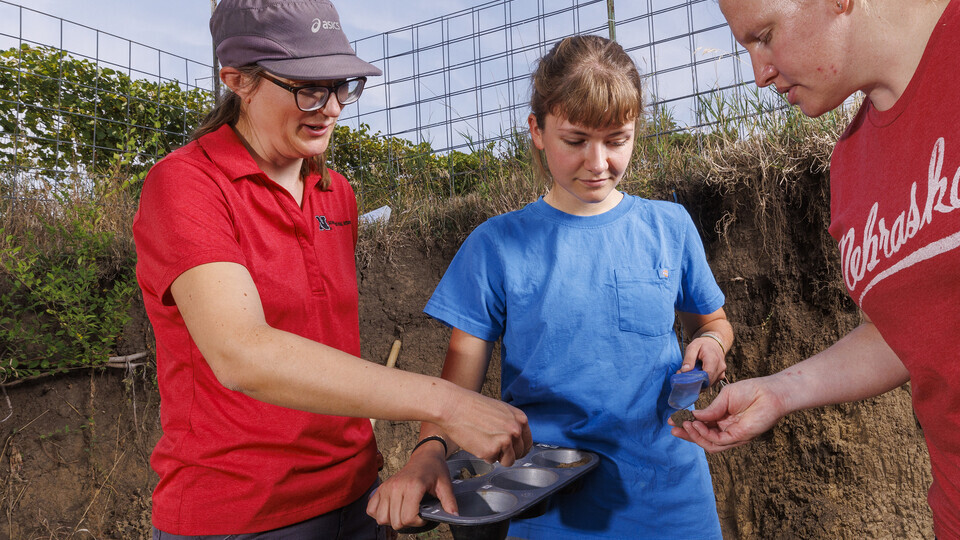
Lincoln, Neb. —As a scientist, Judith Turk is unearthing the stories soil has to tell. As an instructor, she’s uncovering best practices for student learning. She’s fascinated and inspired by both.
“Soil tells an ancient story of the geologic canvas that the soil transformed from, under the influence of climate and vegetation over tens of thousands, sometimes hundreds of thousands of years,” Turk, assistant professor in the School of Natural Resources, said. “The soil can hold clues about what the landscape was like before humans were there, and how humans impacted it. It can also tell you a story about what the land can be used for in the future.”
TurkTurk, who also co-coaches the Husker soil judging team, is among those being honored at the Celebration of Service Sept. 28. Turk is marking her fifth year among University of Nebraska–Lincoln faculty.
In some ways, her journey to Nebraska started at the University of Maryland, where she got her bachelor’s degree in biology. Studying the composition of soil — the foundation for everything from agriculture to construction — was a way to incorporate many of the scientific subjects that Turk enjoyed.
“I’d take a class in microbiology and think, ‘oh, this is really interesting — I want to do this,’ and then I’d take something completely different and think the same thing,” she said. “I could never pick just one thing I wanted to focus on, and then I took a soil science class. What I learned really appealed to me because soils interface between the Earth’s atmosphere, lithosphere, biosphere and hydrosphere, and that’s where all of the components of our environment come together.
“Suddenly, I had found this one thing I could study, but I get to study everything with it. For me, it’s really an innate scientific curiosity that drives me to study soils.”
Whether it be in the classroom, in the soil pits on East Campus, or while coaching the soil judging team with Becky Young, Turk endeavors to share that sense of curiosity and excitement about soil and learning with her students.
“What appeals to me and, I think, the students, is the process of learning how to listen to the soil tell you its life story,” Turk said. “There’s the competition aspect of it that is exciting, but the ethos we try to maintain in our team is that the more important part is the experience and learning, and getting out there in the field.”
Prior to arriving at Nebraska, she held a position at Stockton University in New Jersey, but the Nebraska opening beckoned. The combination of teaching, research and coaching the soil judging team felt like the perfect fit, she said. Once she arrived, she found the collegiality of her colleagues was an added bonus.
“I found really great mentors who want me to succeed, celebrate my accomplishments and encourage me and my goals,” Turk said. “My colleague, Becky Young, who I co-teach and co-coach with, has been a great resource for me. We work really well together, and we’ve been able to have great conversations about teaching and coming up with new ideas.”
At Nebraska, Turk has taken on a research project in conjunction with Purdue University to build out the iSee Soil Mapper in the central United States. The web-based educational tool is designed to help visualize soil landscapes and properties. She is also examining soil change in the state over the span of decades.
“That’s been really interesting,” she said. “We’re resampling sites that were used for soil characterization 60 years ago, and we’ve been evaluating the ways soils have changed or remained the same over the decades of land use. I think some of the more interesting changes we’ve found are in western Nebraska. There are sites that have been continuously irrigated for agriculture and we’ve been seeing that those soils look less arid than they did at the time they were initially sampled several decades ago. They’ve built up more organic matter.”
Turk also became involved with the Faculty-led Inquiry into Reflective and Scholarly Teaching project a few years ago, which has led her to take on new projects in pedagogy.
“I’m always experimenting with my teaching and trying to do things better, and I like to integrate my teaching and research. Being part of a community of faculty who approached our teaching with that kind of curiosity, and experimentation, really keeps teaching exciting and fun for me,” she said. “The FIRST program has been really important to me.”







